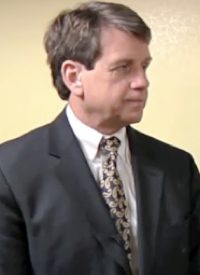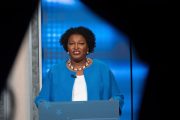
Dr. Michael P. Farris (pictured) is Chancellor of Patrick Henry College and Chairman and General Counsel of the Home School Legal Defense Association. Since founding HSLDA in 1983, Dr. Farris has used his extensive experience in both politics and appellate litigation to defend parental rights and help grow the organization to over 80,000 member families with a staff of sixty. As a constitutional attorney, Dr. Farris has argued before the United States Supreme Court, seven U.S. Circuit Courts of Appeal, and ten state supreme courts.
In 2000, Dr. Farris became the founding president of another unique educational venture: Patrick Henry College. PHC is a four-year Christian college with the mission of training students through a classical liberal arts curriculum and apprenticeship methodology to impact the world “for Christ and for Liberty.” PHC provides academically excellent, baccalaureate-level higher education from a biblical worldview. After serving as president of PHC for six academic years, Dr. Farris transitioned into the role of Chancellor. He continues to teach Constitutional Law and coach the PHC Moot Court team. His teams won the national American Collegiate Moot Court Association championships in 2005, 2006, 2009, and 2010 and defeated Oxford University before two of the highest judges in Britain, and in a repeat match before the Supreme Court of Virginia.
Dr. Farris is an honors graduate of Gonzaga University School of Law (Juris Doctor, 1976), where he was the Articles Editor of the law review and the winner of the Linden Cup Moot Court competition. In recognition of his work in home education, Education Week has named Dr. Farris one of the “Top 100 Faces in Education of the 20th Century.” Heritage Foundation awarded him its Salvatori Award for American Citizenship in 2002.
Dr. Farris was interviewed by senior editor for The New American William F. Jasper in February at the 2011 Conservative Political Action Conference (CPAC) in Washington, D.C., where Dr. Farris was a speaker and panelist.
William Jasper: You’re still head of the Home School Legal Defense Association?
Michael Farris: Yes, Chairman. I was the founder of the Home School Legal Defense Association.
Jasper: And chancellor of Patrick Henry College. Good, so we can cover both of those subjects. And thanks for taking the time to be with us. First of all, Patrick Henry College, how long has that been going?
Farris: This is our 11th academic year. We have about three hundred students. It’s by far the most successful Christian conservative college in terms of training people for government service and particularly those who may be going to law school, those who may be going to intelligence agencies. We’ve got a really good reputation there; we have the highest levels of success in those arenas.
Jasper: You’re in Virginia?
Farris: Yes, we’re in Virginia, about an hour from right here in D.C., and we are a Christian foundation that uses the principles of the Founding Fathers. Everyone at Patrick Henry takes a course on the Constitution that I teach.
Jasper: So you know they are getting a good grounding in the Constitution.
Farris: We also have another year-long course on political philosophy called “Freedom’s Foundation” that is basically why we believe in Freedom; what are the details of believing in freedom, what are the philosophical underpinnings of our freedoms. We really make sure that our students really understand why we are a free people.
Jasper: Every public official takes an oath to uphold and defend the Constitution. You will find almost no one who says they are against it. Everyone says they are for the Constitution, but there seems to be a disconnect here in that we see a continuous drift away from our Constitutional underpinnings.
Farris: The disconnect is based on how do you interpret the Constitution. The are basically two ways. You get five law professors in a room and you will have several theories as to how to interpret the Constitution. It really boils down to two ideas. One, is what did the words mean to the generation that wrote it; or, what do the words mean to someone here today. As long as judges are allowed to interpret the Constitution by some theory of today, they have become lawmakers. The theory of self-government means the law is the law until another body of lawmakers changes it. And so the Constitution, like any other law, like a regular contract, should have the same meaning today that it had at the time it was written. The general welfare clause was a limitation on government power, not a grant of government power. That’s what the Founding Fathers understood. ObamaCare: Is there a constitutional basis for that? No there is not, because the general welfare clause means when you spend money lawfully, you must do so for the general welfare [not] to aid your buddies…. When you understand the original meaning of the Constitution if this town had the original meaning of the Constitution, a third of the federal bureaucracy would go away. And that’s being pretty conservative. You could probably get it down a little more than that. A vast majority of what the federal government tries to do…
Jasper: — under the general welfare, necessary and proper, and the commerce clauses…
Farris: Basically, you fix the general welfare clause, the commerce clause and almost all of it goes away.
Jasper: Your students are getting a full dose of the Constitution, with the original intent, with an understanding of the Federalist Papers and the basic documents of the Constitution.
Farris: With that background, they are going off to top law schools. The executive editor of Harvard Law Review today is one of our graduates.
Jasper: Is that right?
Farris: Yes it is. We have three students from last year’s graduating class that are in Columbia Law School, so we’re sending them out into the upper echelons of the legal profession with that solid grounding. They are not going to be indoctrinated. They’ve already been thoroughly grounded in the truth, and the lies don’t sound very good when you’ve been thoroughly grounded in the truth. With our Moot Court program (a collegiate competition of simulated legal argumentation before hypothetical appellate courts), we won the undergraduate championship five out of the last seven years. We just won it again a few months ago at Tulane Law School.
Jasper: How large is your school again?
Farris: Just under three hundred.
Jasper: How many of your students then are involved in the Moot Court?
Farris: Actually about a quarter of our student body does Moot Court, or some other form of forensics. No college is allowed to qualify more than 8 teams, or can take more than 8 teams to Moot Court, which features competition among the top 64 teams in the country. Every year for the past 6 or 7 years Patrick Henry as qualified 10, 12, 14, 16 teams. So, I took 8 teams again this time, four of the top 8 teams in the country, and we got first and third. Not bad. Not bad for a college of this size where we are debating Princeton, Syracuse, and Holy Cross, and Duke. The year before we beat Harvard. Well, Harvard didn’t even come back to play. We beat them so soundly that they said we don’t even want to do this any more.
Jasper: So we can look forward to some of them becoming law professors and litigators.
Farris: My goal is to train Supreme Court justices, and my theory is that if I flood the zone I teach a high school constitutional class, not only at Patrick Henry, so I’m training about five to six hundred young people a year in original intent of the Constitution. I’ve been doing this for about 15 years, and many of them are lawyers now, many of them are, well a few, are legislators now. I feel that sooner or later we’re going to make the big league, the Supreme Court.
Jasper: The first time I interviewed you for the Home School Legal Defense Association was quite a few years ago. My parents were some of the earliest homeschoolers, homeschooling some of my youngest siblings back in the early 1970s, when I was already in college. HSLDA and home schooling have grown dramatically. What does Home School Legal Defense do?
Farris: Defend the right of home schooling families to have free choices to school their own children. We do that primarily in the United States, we now are helping families in Germany and Sweden. I’m currently co-counsel in the European Court of Human Rights for the family in Sweden, a famous case. We focus on defending families’ rights to home school, and we also fight government agencies where they do unlawful searches and seizures under “child abuse” investigations against homeschoolers, simply because we’re a little different. Homeschoolers are subject to these whispered allegations, whispered rumors over the phone. They call up child services: “I think they do this and such.” We’ve gotten to be fairly expert on Fourth Amendment rights.
Jasper: How has that improved, or how has that deteriorated in recent years?
Farris: The Fourth Amendment issues?
Jasper: Right.
Farris: It has dramatically improved. The cases we’re winning we’ve won a case in the Ninth Circuit, we’ve won one in the [North] Carolina Supreme Court, and other cases in many other jurisdictions those cases help other people, not just homeschoolers. The plain law is, the normal rules of the Fourth Amendment apply to social workers, just as much as they do to police officers in any investigation. You have to have a warrant, or, you have to have probable cause based on an exigent circumstance, which means you have to have a true emergency, AND, you have to have probable cause if you have a true emergency; unless they have those things, they can’t go into any houses. Social workers think that the normal rules of the Fourth Amendment don’t apply to them.
Jasper: Have these cases had an impact in chilling that kind of aggressive enforcement?
Farris: To some degree. We’re pretty successful in talking social workers and police officers out of violating the Constitution, but not all the time. When they continue to violate the Constitution as they do, then we sue. We go after them for civil rights violations. In fact, I was on the phone driving down here, coaching a family who anticipates social services coming out soon, because the child is experiencing a very special medical situation, and one group of doctors is supporting the parents, and there’s one rogue doctor out there who is threatening to turn them in for child abuse. We’re gearing up for this situation. We have a lot of these cases that we deal with every year.
Jasper: Practical matter: A family is home schooling I’ve always told folks they should be members of HSLDA because, it’s what, $100?
Farris: If you join a group it’s $100, your standard support group, otherwise, it’s about $125 per family.
Jasper: If you’re going to have some kind of problem with the local authorities, the school district, you guys are the experts in providing that defense.
Farris: We’ve done more home school cases obviously, than anybody, ever. And, we’ve actually done more Fourth Amendment cases. In fact there’s a law review article written about our Fourth Amendment work asking why are these home schoolers doing so many Fourth Amendment cases. When we start attracting that kind of scholarly comment, it means we are, apparently, making a difference.
Jasper: And you have quite a few lawyers across the country that have become knowledgeable in this area now, that may not be specifically affiliated with HSLDA but work with you on this?
Farris: We do have local attorneys we use, but we do the vast majority of the work with our in-house lawyers, about a dozen lawyers on staff. They become experts on particular states, so anything that happens in Missouri, our guy that handles Missouri he used to be the Deputy Attorney General in Missouri is in our office in Virginia and he handles all the Missouri calls. But if something is happening on the ground and we need to appear in court, then we contact one of our local attorneys that we deal with. We have them on a regular basis, but really when people call HSLDA, they are talking to a lawyer who does nothing other than deal with homeschoolers.
Jasper: What would you say now is the worst state and the best state in terms of circumstances for homeschoolers.
Farris: Well, there are a few states that we could call best states; Virginia is one of them, Montana another. Idaho is one of them. Texas is very good. Worst states? Pennsylvania, New York, clearly are the worst states. Not so much that they are trying to ban home schooling; they are trying to regulate it to death, so you have a lot of busy work, a lot of paper work, a lot of rigmarole in Pennsylvania. When you have rigmarole, you give local authorities discretion, and “discretion” is the enemy of freedom.
Jasper: If you were to look at the big picture, home schooling has obviously expanded tremendously over the last thirty years, where do you see it going now?
Farris: I think that we’re probably going to see up to 10 percent of the population home schooling. That’s in comparison to four percent who are home schooling right now. I think there are that many pragmatic people who are willing to forego a two-income family scenario; sometimes you can pull that off but it’s really hard. You have to be a one-income family pretty much, and be dedicated to doing this; it’s a lot of hard work. I’m convinced that anyone who’s willing to do the hard work can do a successful job. But if you’re not willing to do the hard work, well then find some other way to educate your kids because we don’t want people lackadaisically coming into the home schooling movement. You have to say, I know it’s a big job, but I’m going to do it.
Jasper: [Is there] Anything national that you’re aware of, national legislation that would have a negative impact on the freedom of parents for home schooling?
Farris: Well, the Obama Administration, Barbara Boxer and Hillary Clinton want to see the UN Convention on the Rights of the Child ratified, as well as the convention on women, CEDAW. The convention on the Rights of Children is especially dangerous to home schooling, but CEDAW is also bad. They want to ratify these treaties that would give the government control over our families – completely. So we are leading the charge to kill the Convention on the Rights of the Child. We’re helping others that are trying to kill all the other UN treaties, so we are part of a sovereignty coalition. We’re taking the lead role on the Convention on the Rights of the Child.
Jasper: Where does that stand right now?
Farris: Well, it’s never been sent to the Senate, because they are afraid of us. What we did last time, and what we’re going to do in this session, after the election, is this. Jim DeMint introduced a resolution that condemned the Convention on the Rights of the Child. Our goal is to get 34 cosponsors. When you have 34 cosponsors you’ve got the votes to block a treaty. We had 32 official cosponsors last time. Since we’ve elected some real Republicans this time we don’t think we’ll have any trouble getting 34. That should be done in the next month or so. We’ll get it blocked. We’re also working on a constitutional amendment that would permanently eliminate the use of international law for the issue of parental rights. We don’t want to have this treaty now, we don’t want to have this treaty ever.
Jasper: Dr. Farris, thank you so much for your time.
Farris: Thank you.
Contact information:
Patrick Henry College
Home School Legal Defense Association (HSLDA)



